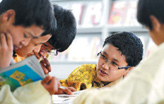Foreign and Military Affairs
China, US should rise above their differences
Updated: 2011-05-09 13:52
(Xinhua)
BEIJING - When Chinese President Hu Jintao visited the United States in January, he called on the governments of the two countries to "ascend a height to enjoy a distant view" in dealing with Sino-US relations.
With this Chinese proverb, he meant to say that both sides should be farsighted and seek common grounds while reserving differences in order to maintain a long-term, healthy and stable development of the bilateral relations.
This should be exactly the objective of the third round of the Chinese-US Strategic and Economic Dialogue, a forum jointly proposed by President Hu and his American counterpart Barack Obama, which will start Monday in Washington and be attended by high-ranking officials from both sides.
Managing disputes
There is no denying that disagreements and disputes between the two sides still exist. Issues such as exchange rate, trade deficit and human rights sounded divisive ahead of the dialogue.
Washington wanted the Chinese Yuan to appreciate faster in hopes of increasing US exports to China, thus reducing its overall trade deficit.
China has long said it would like to increase the flexibility of the Chinese currency - and so Beijing has been doing. Since 2005, the Chinese Yuan has risen more than 26 percent against the US dollar, with 2 percent alone in the past four months.
At the same time, the US exports to China have been rising fast in the last couple of years.
According to the Washington-based US-China Business Council, the US exports to China soared 32 percent last year to a record 91.9 billion dollars. The council also noted China is now the fastest-growing destination for the American exports.
In fact, China's trade surplus with the United States has mainly resulted from the economic globalization. Many of the US imports from China are products of American and other overseas enterprises, which have invested in China and yielded profits that account for the lion's share of the trade surplus.
On the other hand, a plunging dollar, fueled by a loose US monetary policy and high federal budgets, has become the source of many current global economic problems.
A weak dollar has pushed up commodity prices, leading to higher energy and food costs in many countries. Emerging economies like China and India are particularly concerned about their rising inflationary pressures.
Besides currency and trade disputes, Washington has also raised questions about its perceived "deterioration" in China's human rights record.
Being at different stages of social development, China and the United States have different priorities in promoting human rights.
China has made tremendous progress even in the fields of human rights cherished most by Westerners and it has kept dialogues with the US on human rights issues.
But if Washington tries to meddle in China's internal affairs by playing with the issue, it will only lead to animosity between the two sides.
The list of complaints could extend further as Washington was expected to ask Beijing to do more in protecting intellectual property rights, opening up China's financial sector, granting US companies equal access to the government procurement market and so on.
Indeed, dialogue is meant for negotiations where both sides should try hard to bridge their differences. But to make the dialogue more constructive and helpful to building mutual trust, China and the United States should look beyond those disputes.
E-paper

War of the roses
European Chinese rose growers are beating their Chinese rivals at their own game
High-tech park gets big boost
At the source
Merchant of Venice
Specials

2011 Sino-US Dialogue
China and the United States will hold the third round of the Strategic and Economic Dialogue from May 9-10 in Washington.

High-tech park gets big boost
Zhongguancun sets sights on being one of the top technology hubs in the world

Learning to close the gap
Thousands of students have benefited from Tibet middle school program set up outside the autonomous region
